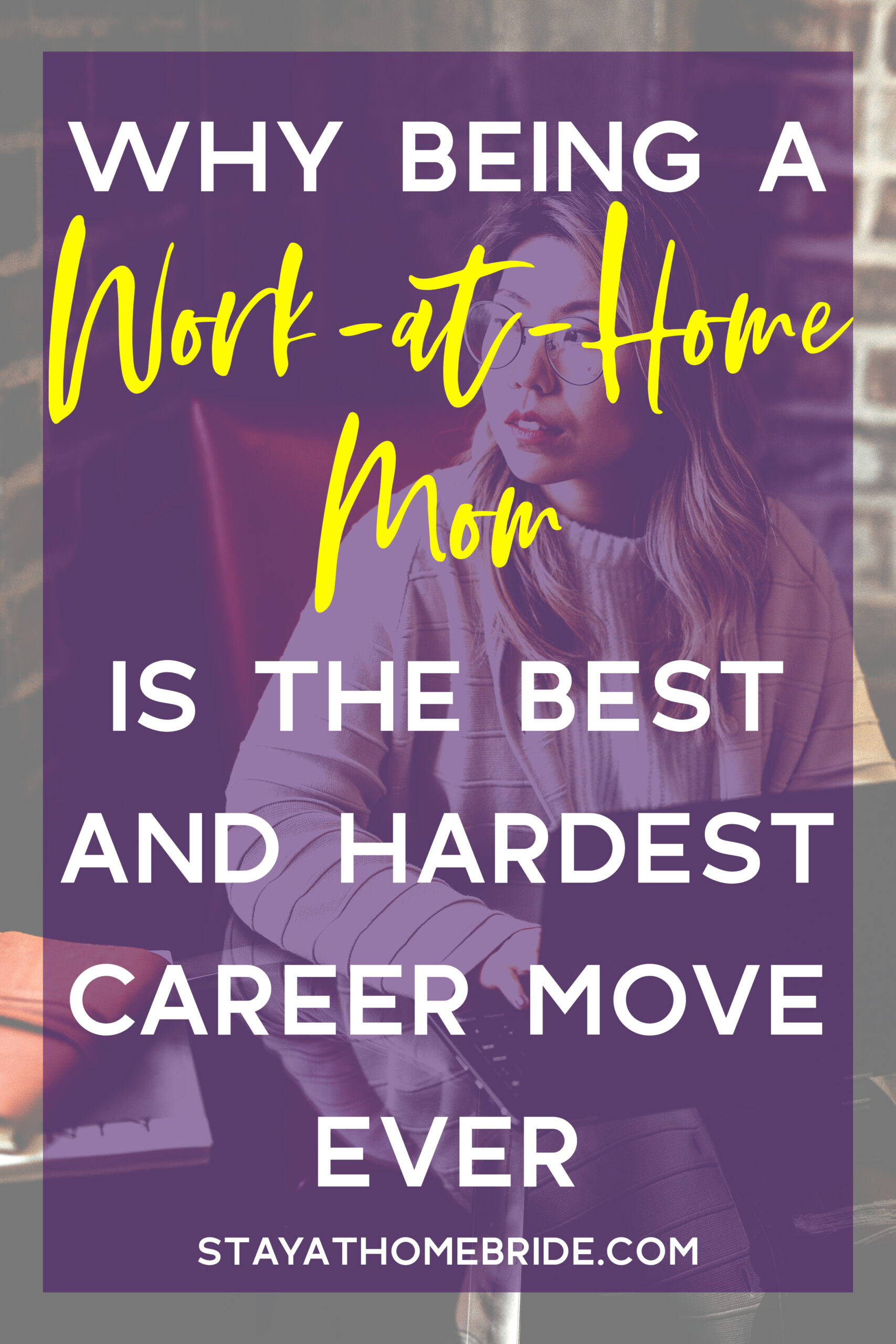I’ve been a mom for about 8 years, and a work-at-home mom (or WAHM) for almost seven.
Before my first child was born, I waited tables and worked retail 60 hours a week. In high school, I babysat every spare minute during the school year, and cleaned houses during the summer.
I’ve also been a magazine editor, dog walker, archivist intern, and warehouse stocker.
This isn’t a humble brag, but simply to underscore that I know what it’s like to work – and in plenty of environments.
And I can say with the utmost of confidence…working from home is both the best and most challenging career choice I ever made.

This post may contain affiliate links. Read my full disclosure about affiliate links here.
What Is My Work-at-Home Job?
Short answer: I’m a writer.
Long answer: I’ve leveraged my skills, experience, and education in writing to grow a few different businesses over the last several years.
Firstly, I’m a freelance writer and editor. This was my first WAHM job, and paid…well, not all that great when I was starting out (I think I once earned twenty cents an hour, when I did the math on a particularly long, horrible project).
I didn’t know what my time was worth. As a result, I didn’t know how to charge clients properly.
But I kept at it. While trudging through my dues, I added to my portfolio and learned exactly which projects to take on, and which to turn down.
I also got better, and I got faster.
Today, I earn $18-30 an hour. Sometimes it’s more – but never less. Learned my lesson. I used to do this anywhere from twenty to sixty hours a week; now it’s somewhere around ten, instead.
Secondly, I’m an indie author. Income for this one fluctuates a lot; I’ve earned anywhere from $20 to $3,000 profit monthly, in the year and a half I’ve been doing it. My average earnings right now are $1,200 a month, with over ten books out.
Being an indie author takes up most of my time right now. It also costs a lot to run (advertisements play a huge role in selling books, nowadays).
Finally, I run this blog. At the time of this writing (pre-launch), it’s earned…drumroll…zero dollars. But I hope to change that very quickly, once I take the time to learn the ins and outs of this new business.

Treat Your Job Like a Real Job – Because It Is
As you can see, my businesses aren’t anything fancy. None earn me a ridiculous amount of money individually. At least, not yet.
Combined, though, I’m able to make a living (in my area, anyway). My goal in the next 4 years is to make a living from each separately.
Some would call this “having multiple income streams,” which is a nice, methodical way of looking at it, in terms of ROI on time and money – but I do think of them as my businesses, and treat them like businesses.
I did this from Day One, before I had even earned one cent.
I think that’s why I’ve seen the growth I have, and it’s what most successful work-from-home moms will tell you is the key to earning a living: treat your job like a real job, even if nobody else does. Even if it doesn’t always feel like one.
People think it’s easy and non-stop fun. That I wake up whenever I want, take frequent naps, or piddle away at the keyboard only when I feel like it, while money comes pouring in.
That’s definitely not the case.
Working from home and being self-employed, especially as a mother, has brought me greater rewards and bigger challenges than I ever dreamed possible.
If you’re a SAHM or working mom looking to join the WAHM ranks, here’s some food for thought.
Spoiler: sometimes, you’re going to hate it. And I still highly recommend it.
Pros of Being a Mom and Working from Home

1. We get more time with our kids.
First and foremost – and the reason most moms choose the WAHM path – is that working from home will allow us more freedom and flexibility to stay home with our kids.
There’s nothing wrong with using daycare or babysitters; every woman is unique, and families have to do what’s right for their situation.
For me, I neither liked nor hated the idea. Getting a part-time job seemed like the ideal compromise.
But…
2. Childcare is expensive.
Don’t get me wrong: I understand why childcare is so pricy, and I’m not saying caregivers need to lower their rates. They provide a crucial service not everyone can do.
But when you’re a young mom who’s brand-new to the single-income lifestyle, you realize pretty quickly that childcare isn’t always affordable.
In my case, the places we lived (my then-fiancé, now-husband traveled for work back then, and we went with him) had very high daycare fees.
And since I was a new graduate who knew I’d be moving within the year, landing a job with great pay was almost impossible.
Any money I would have earned = eaten up by childcare costs.
Mathematically, it just didn’t make sense to rejoin the traditional workforce.

3. You get to make your own hours.
When I started freelancing, I did just a few hours a week when my daughter napped, and occasionally after she was down for the night.
If I needed to sleep in because she’d kept me up all night screaming that precious head off, I could. If laundry was taking over, then I could put work on hold and power through.
When I planned my wedding, I was lucky enough to be free during weekdays, when thrift stores were practically deserted. I found all the best stuff.
Of course, making my own hours had its downside, too – but I’ll get to that.

4. Your earning potential is basically unlimited.
In a traditional job, there’s usually a cap on how high your income can climb.
Let’s say you’re an entry-level employee who moves up to team lead in a couple years’ time. Your income jumps a little as a result, which is great!
Then…the funnel starts.
That corporate ladder gets narrower, then promotions start getting harder. Eventually, you realize there’s nowhere left to climb, unless you shift the career path to something more corporate.
Maybe that was your goal, so no problems there.
But even so, your income is limited within that position. It’ll bump up every few years, but overall there’s a cap on how much you’ll ever earn in one year. Even overtime is not guaranteed.
Sometimes, this is fine with people. They like what they earn – or like the salary they could eventually get “capped at” – and know it’s enough for their goals, dreams, and lifestyle. More power to them.
I knew this wasn’t the path for me, though. I didn’t want to climb ladders and break ceilings. I liked the idea of earning some mysterious maximum, even if it took years of minimums to get there.
When you work for yourself, there’s no limit to how much you can earn.

5. You develop critical skills and discipline that might help you later on.
If you decide to start your own business later, or rejoin the traditional workforce, you’ll have years of experience in time management, task prioritization, and problem-solving to boast about.
Even better is if your WAHM ventures also force you to learn new skills.
I had no idea how to create a newsletter when I started working from home, but doing it for a freelance client made me sit down and figure it out. Now I use it for my indie publishing and this blog.
And, if I ever decide to return to the 9-5 life – though I don’t see that happening! – I’ll have graphic design experience to flaunt on my resume, since I design my own covers, websites, book trailers, blog post graphics…the list goes on.
I’ve even learned to make wedding and bridal shower invitations and signage for friends with these skills – so my work-at-home mom gigs have helped my personal life, too!
All my jobs have made me a faster typist (I average 84 words a minute, these days), which will help a lot if and when I need to apply to a regular 9-to-5 job.
I hope I never do, but at least I know I’ve got some kind of edge.

6. You feel like yourself again.
This is everything.
Of all the reasons I could ever give a stay-at-home mom to become a work-from-home mom, this is the biggest and best, and obliterates all the potential negatives I haven’t even gotten to yet.
Becoming a mom is hard. Becoming a stay-at-home mom is really hard.
When I left the workforce, I had no idea how much my life was going to change. I prepared myself for the sleepless nights and new anxiety; I prepared for less money (well, kind of).
I did not prepare for the loneliness.
I didn’t prepare for the loss of my identity in the face of a brand-new, seemingly all-encompassing one.
I had no idea how much I would miss having coworkers (drama and all), nor how much a little adult conversation made me feel…well, like an adult. When you spend the majority of your day babbling baby-talk, a nice grown-up conversation feels like heaven.
My creativity was stunted, my motivation for anything waned, and I felt like I’d become…not myself.
Of course, we love this new, huge piece of our identity: motherhood. Being a mom transforms you in some incredible ways.
But it’s not all we are. And grappling with the guilt of that – and figuring out how to fix it – is an enormous undertaking.
Working from home didn’t give me the coworkers and chitchat I still missed; it didn’t magically create a schedule and semblance of normalcy in my life. But it was a crucial start.
As soon as I started freelancing, I became a better mother. Period.
I yelled less, cried less, and felt more confident in all my roles, now that I had a “working self” again – even if it was very different than the working self I’d had before.
This might not hold true for everyone, but it did for me. And I’ve read enough forums, mommy blogs, and mompreneur articles to know I’m not alone.
Cons of Being a Mom and Working from Home

1. Work-life balance? What’s that?
Without a doubt, the biggest challenge of working from home is…well, separating work from home.
It’s too easy to postpone a project because the dishes are absolutely disgusting. It’s impossible to get work done when you’ve got a toddler climbing your legs like an expedition to Mt. Everest, and a baby screaming from a swing that, sorry kid, just can’t go any faster.
On the flipside, it’s hard to turn off the “work brain” once you get going. Working through weekends, staying up late, and counting quotas during family dinner are a common problem.
There’s no easy fix, unfortunately, but creating a schedule (one that fits your lifestyle – and it’s probably not going to be 9 to 5) and setting goals for yourself will help.
When I say “goals,” I actually mean for both work and home life. Pick one day a week, at least, when you focus on nothing but your kids; schedule a dinner with friends for the same Tuesday every month.
(Another tip: dishes and laundry can wait a while.)
2. People will forever ask when you’ll “go back to work for real” or “get a real job again.”
Ooh, I hate this so much. I’m glaring at my laptop while I type.
Thing is, I still get asked this stupid question, despite the fact I’ve had my apparently “not real” jobs for years.
Here’s the deal: people who have only ever worked traditional jobs – i.e., not self-employed – seldom understand what self-employment actually looks like.
We don’t sit around in sweatpants working a couple hours a day. We usually work more than forty hours a week – and, even if we don’t, the pressures of running a house and raising kids certainly pushes us into overtime one way or another.
Staying at home is work, all by itself. And working from home is work, too. It’s every bit as real as an office job, just stripped down past the benefits and water cooler chitchat.
Maybe you do plan on returning to the traditional workforce, however, and WAHM life is just a temporary stop for you. That’s okay, and feel free to tell them so.
But if you, like me, are pretty sure you’ll never work for someone else another day in your life…tell those nosey folks you are back at work. For real.
3. People think “making your own hours” means you’re constantly free.
I hate this one too, but not quite as much. In my experience, it’s easier to correct than outright snootiness or judgmental mindsets.
Making our own hours doesn’t mean we can jet off whenever we feel like it. Not if we want to meet deadlines and, you know…earn money.
Yes, there’s a flexibility and freedom to the mompreneur life other jobs don’t provide. When my daughter woke up with a 102-degree fever and earache, I packed her up and took her to the doctor right away, no call to the office required.
On the other hand, I did have to call clients and let them know I couldn’t make our teleconferences. I did get a day behind on my work, which then caused me to stay up late and play catch-up.
Not that I cared. My kids come first, as any mom will agree.
So sure, I had flexibility to do that, and it’s one of the reasons I love working for myself.
I can’t, however, take phone calls in the middle of the day from my mom when she wants to tell me about the turkey she found on sale.
(I mean, I can, but not if I want to get any work done. Love you, Ma.)
That’s the real challenge: distinguishing – to ourselves and others – what can and should be “free time.” Because you don’t have more time as a WAHM; you have less. Your time just becomes slightly more flexible.

4. No sanctity. No solitude. And no silence.
Initially, you’re going to have a very hard time finding quiet, peaceful hours to work, especially if you’ve got multiple kids over the age of…oh, let’s say, “minutes old.”
Even if you’ve got a dedicated home office, it might take your family time to adjust to the idea that – even though you’re “home” – you’re actually at work.
Now, I knew when I started working from home that I’d have children underfoot, interrupting, and not respecting my work hours.
That’s par for the course, because kids are always in Play Mode (as they basically should be). So they assume the rest of the world is, too.
Kids barging in annoys me, but it doesn’t anger me, really.
My husband doing it, on the other hand…
We had a breakthrough on this about 4 years into my freelancing, when he started working from home some days too.
Because his workdays consisted of waiting around for client calls, he had a lot of downtime. And boredom.
And, as a result, he bugged the everloving crap out of me.
Finally, I told him enough was enough. “You don’t respect my work hours, because you don’t think of my job as being real.”
“Of course I do!”
“Okay, then,” I challenged. “If I came into your workplace or called you every twenty minutes because I lost the remote, couldn’t find the kids’ clean clothes, or just wanted to show you a funny meme I saw on Facebook – wouldn’t you think I didn’t respect your job?”
My husband grew quiet. Which, for him, means he’s either sleeping, or thinking.
“Fine. Fair enough,” he said.
And he stopped barging in. He even sat the kids down and explained that, when the bedroom door was closed, Mommy was hard at work and couldn’t be interrupted.
We also reached the agreement that, every two hours or so during long stretches, I’d pop out and spend twenty minutes with the family.
Since I tend to hole myself up in a bubble and work for half the day without realizing it, this was a good compromise.

5. You might make crappy money, in the beginning. Keep going.
Finally, the cold, hard truth about working for ourselves: there’s no guaranteed income level. Especially when you’re new.
Each of my businesses (or income streams) started with little to no capital upfront to invest, so I had to grow slowly – reinvesting my profits into each venture over time.
This meant that, when the first paychecks of $30 to $50 came in, I didn’t even see the money. It funneled itself right into my expense accounts.
But, over time, profits grew with each business. Freelancing was a little different, of course; it didn’t rely on promotional tools, at least nothing big. But I was able to get my freelance website going, and print professional business cards to hand out, which increased my client base.
Others see greater success, and much sooner than I did, whether on the same paths or not. So I’m not being a Debbie Downer about everything, here.
Dream big. Assume great money is gonna come your way, right from the start. Aim as high as you want to.
And if you miss the mark, keep trying.
A few months of focus and perseverance (or a year, or two, depending on how many hours you can devote and the career you choose) will yield results you’re proud of.
But, even in those early days when you barely earn enough for it to feel worth it…you should still be proud.
You’re building your career, while caring for a household and raising your family.
Are you a stay-at-home or working mom, looking to transition to working from home while caring for your kids? What challenges have you faced so far? Share your thoughts in the comments!









